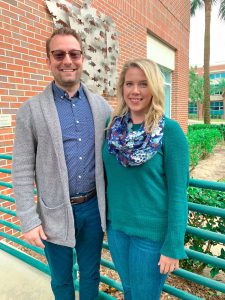 Please welcome two Food Science and Human Nutrition graduate students who are making a difference in the world of nutrition and neurological disorders! Carley Rusch and Matthew Beke are pursuing Ph.D.’s in nutritional sciences under the guidance of Dr. Bobbi Langkamp-Henken. They also work at the UF Health Norman Fixel Center for Neurological Diseases on projects studying the impact of nutrition on neurological disorders. Read on to learn more about the work of this dynamic duo, how they got into nutritional sciences, and, of course, their favorite meals from all over the world!
Please welcome two Food Science and Human Nutrition graduate students who are making a difference in the world of nutrition and neurological disorders! Carley Rusch and Matthew Beke are pursuing Ph.D.’s in nutritional sciences under the guidance of Dr. Bobbi Langkamp-Henken. They also work at the UF Health Norman Fixel Center for Neurological Diseases on projects studying the impact of nutrition on neurological disorders. Read on to learn more about the work of this dynamic duo, how they got into nutritional sciences, and, of course, their favorite meals from all over the world!
Tell me about your latest research projects. What are some of the connections between nutrition and neurological disorders?
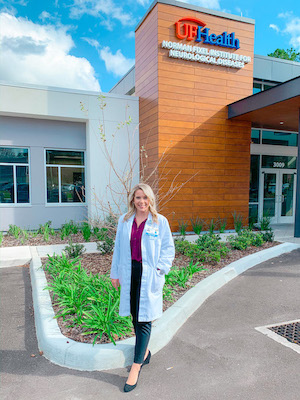 Carley: Over a year ago, the Department of Neurology received a generous gift from the Fixel family to help further their goal of providing a unique interdisciplinary approach to care for those afflicted by disorders of movement, mood, and memory. One of their initiatives was to add a registered dietitian nutritionist (RDN) to their interdisciplinary team that could provide evidence-based medical nutrition therapy for their patients at the UF Health Norman Fixel Institute for Neurological Diseases. Many people may be surprised how diet can play a significant role in the treatment and management of neurodegenerative diseases!
Carley: Over a year ago, the Department of Neurology received a generous gift from the Fixel family to help further their goal of providing a unique interdisciplinary approach to care for those afflicted by disorders of movement, mood, and memory. One of their initiatives was to add a registered dietitian nutritionist (RDN) to their interdisciplinary team that could provide evidence-based medical nutrition therapy for their patients at the UF Health Norman Fixel Institute for Neurological Diseases. Many people may be surprised how diet can play a significant role in the treatment and management of neurodegenerative diseases!
Matt and I counsel a variety of patients with different sets of needs. Often, patients with Parkinson’s disease may struggle with unintentional weight loss as a symptom of their disease or medication, increasing their risk for malnutrition. Those with amyotrophic lateral sclerosis (ALS) may require enteral nutrition via a feeding tube due to difficulty swallowing. In other disorders such as Alzheimer’s disease and multiple sclerosis (MS), patients may require diet education to incorporate more anti-inflammatory foods such as fruits, vegetables, and nuts that can aide in preserving cognitive function.
Because there is limited research in the field of nutrition and neurodegenerative diseases, Matt and I not only strive to facilitate innovative projects that can advance current therapies for symptom management, but also interventions that can improve their overall quality of life. Currently my research interests are using dietary interventions to improve gastrointestinal function in PD. Constipation is a common and debilitating non-motor symptom of PD that is poorly understood and has limited treatment options. Disease progression may be influenced by gastrointestinal dysfunction, including intestinal permeability, inflammation, and a dysregulated microbiota-gut-brain axis. We conducted a pilot study that suggests a Mediterranean diet, which emphasizes foods rich in fermentable fibers and antioxidants, can reduce symptoms of constipation in patients with PD, but may also result in unintended reductions in body weight, thus altering the benefit-to-risk ratio of this dietary intervention. The goal of my larger dissertation project is to test the efficacy of a Mediterranean diet intervention on improving the clinical symptoms of constipation, clarify the risks of unintended weight loss, and determine the effect of this intervention on gut microbiota and markers of intestinal inflammation and permeability.
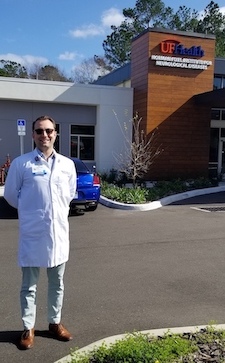 Matt: It seems like every day, new research comes out pointing to the “gut,” or the microbial communities in the intestines, as a potential disease etiology or a potential therapy. Neurological conditions are no different. You can’t search “Parkinson’s Disease” (PD) on the internet without seeing tons of articles on the “Gut-Brain Axis,” and for good reason. Research suggests that microbial dysbiosis may be involved in the early stages of PD and can cause some gastrointestinal symptoms. We want to see if we can improve a PD patient’s quality of life by improving their gastrointestinal function. A probiotic supplement may be able to accomplish this. We’ll utilize a questionnaire we developed in house to detect changes in these participant’s digestion-associated quality of life.
Matt: It seems like every day, new research comes out pointing to the “gut,” or the microbial communities in the intestines, as a potential disease etiology or a potential therapy. Neurological conditions are no different. You can’t search “Parkinson’s Disease” (PD) on the internet without seeing tons of articles on the “Gut-Brain Axis,” and for good reason. Research suggests that microbial dysbiosis may be involved in the early stages of PD and can cause some gastrointestinal symptoms. We want to see if we can improve a PD patient’s quality of life by improving their gastrointestinal function. A probiotic supplement may be able to accomplish this. We’ll utilize a questionnaire we developed in house to detect changes in these participant’s digestion-associated quality of life.
What helped you decide to go to graduate school after obtaining your RDs? Would you share how you chose the Nutritional Sciences doctoral program?
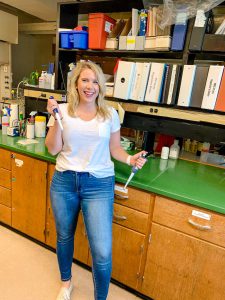 Carley: I was involved in clinical research in the lab of Dr. Bobbi Langkamp-Henken when I was an undergraduate dietetics major at UF. Volunteering in her lab sparked my interest in nutrition research, specifically nutrition interventions that can improve gastrointestinal and immune function. Because of my research interests, I knew graduate education would be a perfect fit to provide me with advanced education and interpret current nutrition research that I could translate to patients and their caregivers as an RDN. I was matched to UF’s Coordinated Master of Science and Dietetic Internship program (MS-DI) and continued to work for Dr. Henken as a research coordinator.
Carley: I was involved in clinical research in the lab of Dr. Bobbi Langkamp-Henken when I was an undergraduate dietetics major at UF. Volunteering in her lab sparked my interest in nutrition research, specifically nutrition interventions that can improve gastrointestinal and immune function. Because of my research interests, I knew graduate education would be a perfect fit to provide me with advanced education and interpret current nutrition research that I could translate to patients and their caregivers as an RDN. I was matched to UF’s Coordinated Master of Science and Dietetic Internship program (MS-DI) and continued to work for Dr. Henken as a research coordinator.
After my master’s degree, I worked for two years as an RDN at AdventHealth Orlando in oncology and nutrition support. During this time, I learned there are many unanswered questions and out-of-date practices in the nutrition field which give dietitians opportunities to create change within their community. I began providing continuing education to my colleagues and collaborating on projects to update policies within the hospital system that would provide evidence-based medical nutrition therapy. These opportunities sparked my desire to work more in research to advance the field of nutrition. It was an incredible opportunity when I was offered to come back to UF to not only pursue my doctoral degree in nutritional sciences, but also coordinate an outpatient nutrition program with the Fixel Institute as it combines both of my interests in research and as a practicing RDN. Dr. Henken and the faculty in the UF Food Science and Human Nutrition Department are remarkable mentors to help me advance my career.
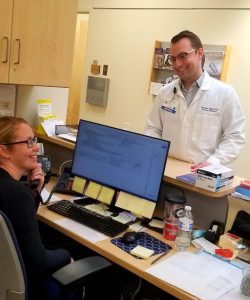
Matt: During the dietetic internship, I really started to toy with the idea of a master’s degree, or even a Ph.D. (We know how that turned out.) I really enjoyed learning about clinical dietetics and still find it fascinating. The fact that 63% of deaths are from non-communicable diseases world-wide (WHO, 2013) shows how we need to understand and prioritize education around the world. Nutrition is a major player in preventing these illnesses and improving lives. Continuing to learn the nutritional sciences will reveal new research opportunities and make educating the public that much easier.
What do you want to do after graduation?
Carley: I would love to continue working in research that combine my skills as a nutrition scientist and RDN by focusing on dietary interventions to improve nutritional status as well as gastrointestinal and immune function among different populations.
What do you like to do in your free time?

Matt: Making sure my three dogs and two cats are intellectually stimulated and happy are a big priority. When I’m not at Possum Creek Park playing with them, I like to ride my road bike. I also spend a significant amount of time in the kitchen, whipping up Mediterranean and Indian cuisine. Still have a lot to learn! Time permitting, I love to play Texas Hold’em too!
Carley: In my free time I love cooking/baking new recipes and going to Gator football games. I also enjoy playing in a local kickball league for the past couple years. Our team has won back to back championships the past two seasons and we are looking for a three-peat! When I’m not cooking or playing kickball, I enjoy weightlifting and spending time boating with my family.
Say I took you both out to lunch and said you could order anything you wanted in the whole world, on me. (Let’s just say the restaurant is very well stocked!) What would you order, and why?
Carley: This is really hard for me, because I feel there is this stereotype being in the nutrition field we have to eat “healthy” 100% of the time. I would probably order some type of gourmet cheeseburger loaded with veggies and bacon because who doesn’t love a burger with bacon and cheese? Dietitians are humans too.
Matt: I, like many other people, love spicy and aromatic flavors. I wouldn’t be upset if they made a nice Indian vegetable kofta dish, with a rich curry sauce. And you can’t forget a side of garlic naan bread.
Interested in learning more about the field of nutritional sciences and other fascinating projects like Matt’s and Carley’s? Read more here!
P.S. Want to read more about the amazing work going on in the FSHN department? See our previous student and faculty profiles below:
Graduate Student Profile: Savanna Curtis, Food Science
Undergraduate Student Profile: Shannon Mai, Dietetics
Faculty Profile: Dr. Naim Montazeri, Food Virology
 0
0
